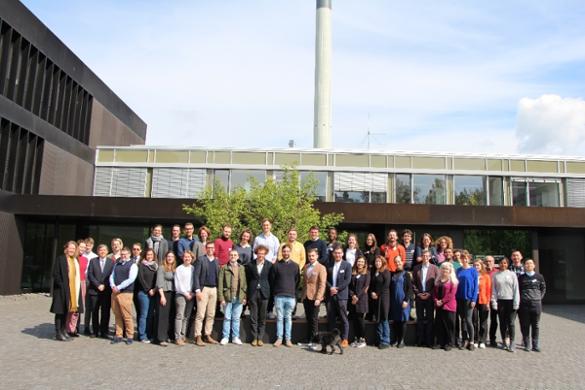Sie befinden sich hier: Forschen am Institut Gesprächs- und Arbeitsformate Max Planck Master Class Daniel Halberstam
From Madison to Trump – US-Verfassungsrecht im Lichte aktueller Entwicklungen mit Professor Daniel Halberstam
Vom 24. bis 27. April 2023 fand am MPIL die Master Class 2023 zum Thema “The Construction and De(con)struction of Rights in America: Practice and Anti-Practice from Madison to Trump” mit Professor Daniel Halberstam statt. Professor Halberstam ist Eric Stein Collegiate Professor für Öffentliches Recht und US-Verfassungsrecht sowie Direktor des European Legal Studies Programm`s an der University of Michigan
Professor Halberstam’s anspruchsvolles Programm führte die fünfzig ausgewählten Teilnehmer:innen der Master Class anhand der sokratischen Methode durch ausgewählte richtungsweisende Entscheidungen des US Supreme Court von der Gründung der Vereinigten Staaten bis heute. Dabei gab Professor Halberstam den Teilnehmer:innen fünf Instrumente zur Hand, die zur Auslegung von US-Verfassungsnormen, insbesondere der Grundrechtsbestimmungen der Bill of Rights, dienen: (1) Originalismus und verschiedene Arten der wörtlichen Auslegung, (2) Geschichte, (3) Systematik und das Zusammenspiel der verschiedenen Normen, (4) Präzedenzfälle und schließlich (5) bestimmte (gesellschafts-)politische Erwägungen.
Die Eröffnungssitzung befasste sich mit den grundlegenden Verfassungsprinzipien, die in den ersten Jahrzehnten des neu gegründeten Staates bis zur Phase des Wiederaufbaus der Republik nach dem Bürgerkrieg entwickelt wurden. In der zweiten Sitzung am folgenden Tag wurden unter dem Titel „Canon and Anti-Canon“ zahlreiche geschichtsträchtige Entscheidungen diskutiert, wie etwa Brown v. Board of Education (1954), die das Ende der rechtlichen „Rassentrennung“ in den USA einläutete, oder Roe v. Wade (1973), in dem der damalige Supreme Court durch eine progressive Auslegung des Rechts auf Privatsphäre ein verfassungsmäßiges Recht auf Abtreibung anerkannte. Die dritte Sitzung behandelte "The Modern Construction of Rights" und vertiefte US Supreme Court Entscheidungen, die in der Zeit unter Chief Justice Earl Warren (1953-1969) ergingen. Es ging außerdem, um die Anerkennung und Grenzen verschiedener Grundrechte, wie dem Recht auf Privatsphäre, politische Rechte, Gleichheitsrechte und Menschenwürde, und wie diese durch die Richterinnen und Richter in der amerikanischen Verfassung von 1791 verankert wurden. In einer letzten Sitzung wurden unter dem Titel „Abortion, Guns, Politics“ aktuelle Themen und insbesondere die jüngsten Entscheidungen des US Supreme Court der letzten Jahre diskutiert.
In allen Sitzungen wurde lebhaft diskutiert und die Möglichkeit des Austausches über Gerichtsentscheidungen und Texte bis zur letzten Minute erfolgreich genutzt. Auch ein in das Programm der Master Class integrierter Spaziergang auf dem Heidelberger Philosophenweg bot den Teilnehmenden die Möglichkeit, über das Kursprogramm hinaus mit Professor Halberstam und den anderen Wissenschaftler:innen in Austausch zu treten.
Ergänzend zum Programm der Masterclass fand am letzten Abend im Deutsch-Amerikanischen Institut (DAI) eine öffentliche Veranstaltung und Diskussion zwischen Professor Halberstam und Professor Christoph Möllers von der HU Berlin statt, in welcher die beiden renommierten Verfassungsjuristen die provokante Frage debattierten: Ist die amerikanische Verfassungsgerichtsbarkeit bankrott?
Mareike Ronellenfitsch



